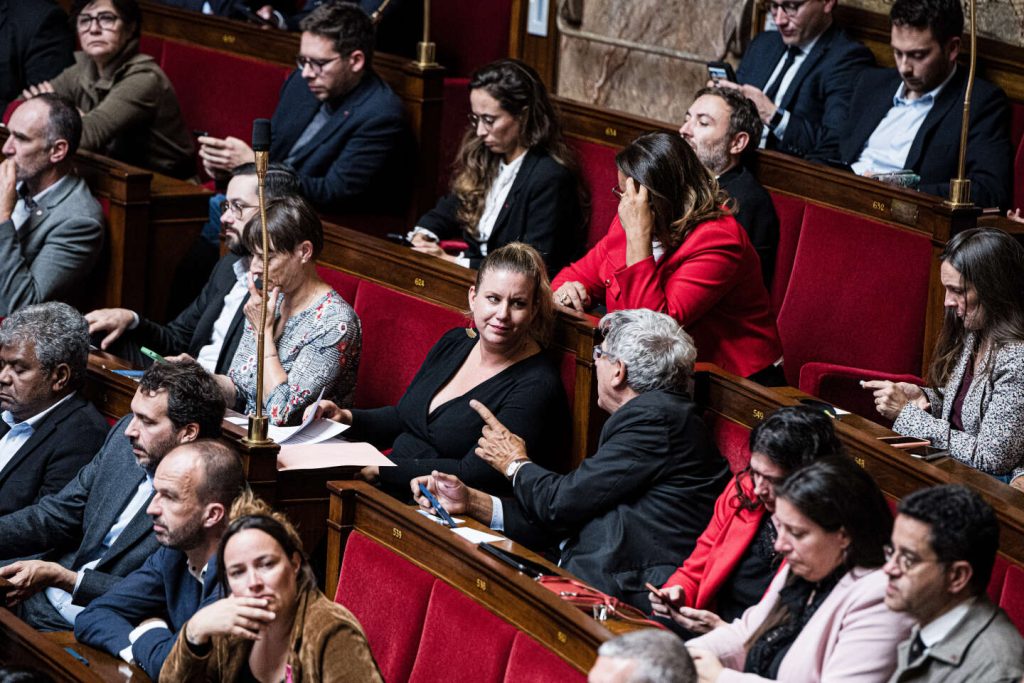Mathilde Panot, the deputy for Val-de-Marne and president of the La France insoumise (LFI) group, has a discussion with Eric Coquerel, the deputy for LFI in Seine-Saint-Denis, at the National Assembly on October 1st, 2024. The alliance of left-wing parties did not propose a common alternative budget for the first time since 2022. Instead, on October 9th, the New Popular Front (NFP) presented ten tax proposals in the form of “NFP common amendments” that they believe will generate an additional 49 billion euros in revenue. The decision not to create a comprehensive alternative budget was due to disagreements among the four left-wing groups, making it challenging to create a unified roadmap, especially with the pressure to be credible as the possibility of governing loomed larger in everyone’s minds.
The proposed tax measures primarily target the wealthiest individuals and corporations. For example, the introduction of a climate wealth tax on fortunes exceeding 1 million euros with progressive rates could generate 15 billion euros in revenue. The left-wing parties also aim to modify inheritance tax exemptions for “golden inheritances,” potentially bringing in around 7 billion euros. Additionally, they suggest ending employer exemptions on salaries twice the minimum wage, which could result in a revenue increase of 8 billion euros. Other proposed measures include reducing the research tax credit by 3 billion euros, implementing a financial transactions tax, taxing profits and superdividends, and reinstating the business value-added tax abolished by Emmanuel Macron, which could generate 10 billion euros for the state.
The emphasis of these tax proposals is to distinguish the left-wing parties from Michel Barnier, as they target the wealthiest individuals rather than the middle and working classes. The goal is to present a united front with ready-to-use measures that will make an impact on public opinion. The left-wing parties believe that their tax proposals, which include taxing the wealthy and corporations, have the potential to generate substantial revenue while also addressing issues such as low wages and unemployment traps. They see these measures as a way to demonstrate their commitment to addressing economic inequality and redistributing wealth in a more equitable manner.
In contrast to previous years, the left-wing parties faced increased pressure to present coherent and credible fiscal policies in the lead-up to the next legislative elections. The fact that they were unable to agree on a joint alternative budget reflects the challenges of finding common ground among the different parties within the left-wing alliance. With the possibility of governing becoming more tangible, there was a greater focus on demonstrating unity and presenting concrete measures that would resonate with the public. Despite internal disagreements, the left-wing parties made an effort to align their proposed tax measures with their broader political aims of promoting social justice, economic fairness, and addressing wealth inequality through targeted fiscal policies.
Overall, the left-wing parties’ tax proposals are designed to address economic inequalities by targeting the wealthiest individuals and corporations. These measures aim to generate significant revenue by introducing new taxes on high wealth and inheritance, ending employer exemptions, reducing tax credits, and implementing new taxes on financial transactions and corporate profits. While the left-wing parties faced challenges in creating a joint alternative budget, they remain committed to presenting a united front and demonstrating their readiness to govern by proposing concrete and impactful fiscal policies that prioritize social justice and wealth redistribution.


